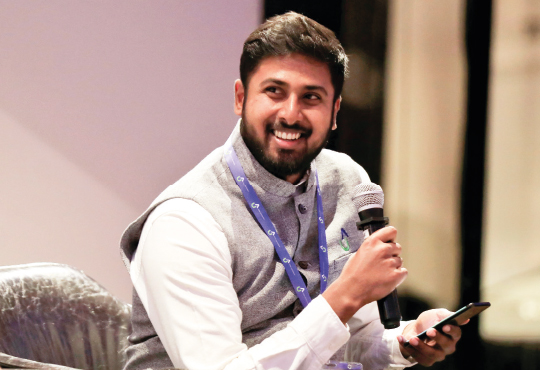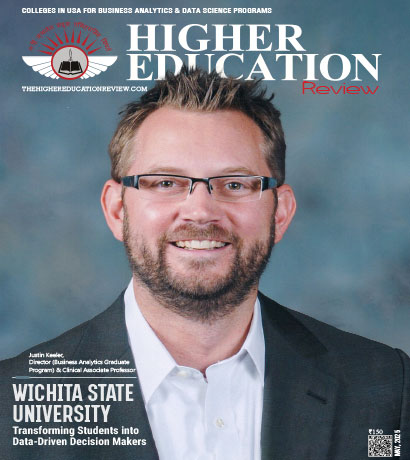Skilling The New Indian Workforce: What Must The Education System Do To Build Career-Ready Students?

Kaushik Raju, Trustee, Atria University
The future workplace is here. It is virtual, highly digitalized, closely collaborative, empowers employees, and thrives on 360-degree feedback. The pace of change has required that the office staff be deeply engaged in everyday operations and not wait for tasks to be assigned.
The office of today demands a motivated team that is proactive, open to take on challenges, and team members can work independently. This has caused a gradual departure from an authoritative management style to a more participative one, wherein management no longer assigns tasks but manages activities of the team.
"The office of today demands a motivated team that is proactive, open to take on challenges, and team members can work independently"
Given the workplace transformation, has our education system kept pace with it to ensure graduates are workforce ready?
Our educational curriculum and pedagogies must incorporate skill-development based learning that emphasizes 'doing' and learning rather than reading and learning. Theory must exist but as a backup to understanding how it operates in the real world, in the industry.
Our education system needs to focus strongly and effectively on providing students with a learning environment where they are exposed to global processes, best practices, and industry-specific problems and be actively encouraged to find their solutions for these.
Take for instance a very deeply felt issue in the Information Technology arena in India: more and more, IT thought leaders are saying that the current day workforce may understand programming language but lack the creativity to come up with newer products or tools. That is, we are still a software services economy rather than a software product economy.
How do we change this? By creating an educational system and a teaching methodology where students learn not just programming language but also art, design, creativity, humanities, and related subjects. But it must not stop there. Students must be encouraged to participate in events such as hackathons and incubator workshops, where they meet industry leaders to understand what is required, where the gaps are, and what products exist. And this must not just be a one-off exercise. Our educational system, syllabi, methods of evaluation must all be re-tooled and re-purposed to provide a better skill-development oriented learning to students.
New Age Curriculum for New-Age Careers
The student of today knows what she or he needs. By the time our students arrive in the final year of their undergraduate program, they have their entire career map planned out. They know which overseas universities to apply to or which campus placement interviews to attend. Students are exposed to and communicate with a global student population and have thus a wider range of options to choose from when it comes to careers or higher education.
Given this scenario, it is imperative our learning systems and teaching processes also keep pace. The focus must be on understanding individual goals and needs and building the environment in which they can best achieve this. Skill development must take precedence over classroom rote learning.
Teachers, support staff, administrators and policy-makers must think of cross-discipline and multi-discipline solutions rather than insist on specializations. Science and humanities must be given equal importance, and design-based thinking and the programming language must both be tested at the same level. Knowledge and skill are different things, and students must learn to apply knowledge in a practical and real-world environment through internships, industry placements, and workshops.
Our universities must become centers where critical thinking is encouraged, where students can and should question the status quo, question why things are the way they are and are encouraged to design and build new things.
All this will ensure that we not only have a creative and highly-skilled workforce, but also a generation of future-ready leaders.
Kaushik Raju, Trustee
Kaushik focuses on improving the education system, especially through advanced learning methods such as Xcelerator, collaborative learning community bringing together academia and industry and flipped classrooms. Kaushik is the lead partner in Intellicar Telematics, a Bangalore-based vehicular telematics startup established in 2015. Intellicar won the first place in EMERGE 10 (2017), as part of Nasscom's EMERGE initiative. Kaushik Raju understands the importance of eco-friendly business models and sustainability. Kaushik focuses on implementing environmental-friendly initiatives like hydroponics to improve and conserve water and energy in his businesses. In his spare time, Kaushik indulges in farming to get quality veggies and greens for his kitchen.
The office of today demands a motivated team that is proactive, open to take on challenges, and team members can work independently. This has caused a gradual departure from an authoritative management style to a more participative one, wherein management no longer assigns tasks but manages activities of the team.
"The office of today demands a motivated team that is proactive, open to take on challenges, and team members can work independently"
Given the workplace transformation, has our education system kept pace with it to ensure graduates are workforce ready?
Our educational curriculum and pedagogies must incorporate skill-development based learning that emphasizes 'doing' and learning rather than reading and learning. Theory must exist but as a backup to understanding how it operates in the real world, in the industry.
Our education system needs to focus strongly and effectively on providing students with a learning environment where they are exposed to global processes, best practices, and industry-specific problems and be actively encouraged to find their solutions for these.
Take for instance a very deeply felt issue in the Information Technology arena in India: more and more, IT thought leaders are saying that the current day workforce may understand programming language but lack the creativity to come up with newer products or tools. That is, we are still a software services economy rather than a software product economy.
How do we change this? By creating an educational system and a teaching methodology where students learn not just programming language but also art, design, creativity, humanities, and related subjects. But it must not stop there. Students must be encouraged to participate in events such as hackathons and incubator workshops, where they meet industry leaders to understand what is required, where the gaps are, and what products exist. And this must not just be a one-off exercise. Our educational system, syllabi, methods of evaluation must all be re-tooled and re-purposed to provide a better skill-development oriented learning to students.
New Age Curriculum for New-Age Careers
The student of today knows what she or he needs. By the time our students arrive in the final year of their undergraduate program, they have their entire career map planned out. They know which overseas universities to apply to or which campus placement interviews to attend. Students are exposed to and communicate with a global student population and have thus a wider range of options to choose from when it comes to careers or higher education.
Given this scenario, it is imperative our learning systems and teaching processes also keep pace. The focus must be on understanding individual goals and needs and building the environment in which they can best achieve this. Skill development must take precedence over classroom rote learning.
Teachers, support staff, administrators and policy-makers must think of cross-discipline and multi-discipline solutions rather than insist on specializations. Science and humanities must be given equal importance, and design-based thinking and the programming language must both be tested at the same level. Knowledge and skill are different things, and students must learn to apply knowledge in a practical and real-world environment through internships, industry placements, and workshops.
Our universities must become centers where critical thinking is encouraged, where students can and should question the status quo, question why things are the way they are and are encouraged to design and build new things.
All this will ensure that we not only have a creative and highly-skilled workforce, but also a generation of future-ready leaders.
Kaushik Raju, Trustee
Kaushik focuses on improving the education system, especially through advanced learning methods such as Xcelerator, collaborative learning community bringing together academia and industry and flipped classrooms. Kaushik is the lead partner in Intellicar Telematics, a Bangalore-based vehicular telematics startup established in 2015. Intellicar won the first place in EMERGE 10 (2017), as part of Nasscom's EMERGE initiative. Kaushik Raju understands the importance of eco-friendly business models and sustainability. Kaushik focuses on implementing environmental-friendly initiatives like hydroponics to improve and conserve water and energy in his businesses. In his spare time, Kaushik indulges in farming to get quality veggies and greens for his kitchen.

